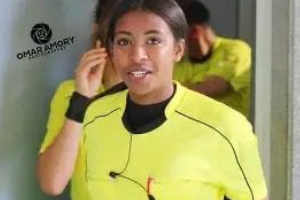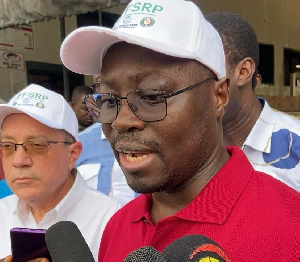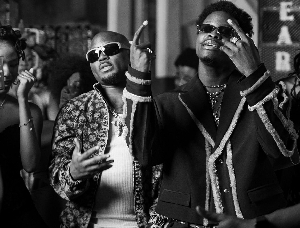By
Kwami Agbodza
Ghana is free, but everywhere Ghanaians, forever the leading lights on the African continent, lack the boldness to defend the cause of free economic thought with clarity.
The liberal-conservative elite class whatever the reasons have come to lack real economic balls to develop a private axis of accumulation for Ghana rooted in a balanced economy. They are currently supported by IMF-World Bank ideology of private sector economic leadership from showing socio-economic leadership and developing a social axis of accumulation for Ghana as a whole. Ghana as a whole does not therefore have a national axis of accumulation that builds fixed capital and provides adequate ongoing working capital. And yet the statistics fraudulently tell us Ghana has been growing; in 2008, can you believe it, at 6.2% astonishingly.
In the past the misguided liberals and conservatives combined their forces to combat and defeat both militarily and illegitimately the progressive forces that had attempted to develop a progressive social order of an increasing standard of life for all Ghanaians. The illegal destruction of progressive forces was followed by the building of an illegal liberal free market economy by 1992 in which Government must be small, fiscal deficits shunned and all markets liberalised to the highest degree. More crucially, without its own axis of accumulation to independently sustain it, it was to be sustained on donor funding as a result of which the political policy of the liberal-conservative state could be controlled by donors and development partners. This material basis came to be upheld by a new liberal-conservative Parliament in which either liberals or conservatives was a majority and the other a minority; opposition was banned or if you like was written into the constitution or the parliamentary bye-laws binding even independents; the executive tightly controlled Parliament as a rubber stamp and the executive itself was indirectly controlled by donors and development partners through the IMF-World Bank.
Ghana has thus been turned into a Ponzi scheme for the benefit of the Liberal-Conservative elite and the scheme funded with donor funds from foreign interests for our human and physical resources. Donors and development partners do not invest in the political economy of Ghana to improve the standard of living of Ghanaians – lets all be clear about this. The foreign-local liberal-conservative elite treat Ghana as a cash cow for the locals, repatriateable profits for foreign firms and a source of human and physical resources for foreign industries. Ghana’s liberal economy spearheaded not by Ewes at the time was built as a ponzi scheme for the liberal-conservative elites to live a high standard of life while the Ghanaian Majority whatever their ethnicity live on less than $2 a day.
Donors and development partners from the G8 fund our domestic budgets so that the Ghanaian economy does not collapse as a result of which the elites lose their political roles; but donors would quite like to fund lower and lower budgets made possible by low levels of national economic activity making values worth more in future time periods. So donor funds are dated and not always cash.
So government must be as small as possible, budgets must be balanced as much as possible and the economy freed for maximum foreign exploitation. Hence free market economics. The result is high interest rates, deteriorating exchange rates and increasing inflation that discourages industrial investment either private or public. The IMF-World Bank thus advices the Government not to also increase expenditure on central and local government and not to fund welfare programmes; in other words not to invest in public, civil and industrial capital.
The political case is spuriously made that the economic fundamentals are not right as if they will ever be right and that Government needs to stabilise the economy and that it is the most important government policy. Thus lower inflation becomes the most important macroeconomic target which the structure of the economy keeps increasing. The political case is also spuriously made that fiscal and balance of payments balances are fundamental policy objectives. In return for adhering to such a broad framework of foreign policy control donor funds are made available as part of the game.
Thus while a government is in office and broadly follows this policy position, the IMF-World Bank keeps quiet. But sooner rather than later the people become dissatisfied and seek political change in order to effect economic change. If the same government wins the election, not much need be said, since it should play the game in all probability. But if power rotates to the alternative in the liberal-conservative game and the people begin to develop any ideas of the possibility of economic liberation, the IMF-World Bank must quickly issue reports aimed ultimately not at the Government, Liberal or Conservative, but at the Majority Poor generally not to think that the Government has the resources to change their microeconomic experiences. At the same time as the Majority Poor are being told that they should not expect much to change, front-loaded fund allocations are immediately or will be made immediately available to the new administration to spend as it pleases in broad terms. The conditionality of front-loaded funds is to get them to play the game. In all this, Donors and development partners do not themselves openly say anything; they all do their talking through the IMF-World Bank Directors and their deputies who are the Spokespersons on behalf of Foreign Donors and Development Partners (Foreign Governments) that control them. In some cases, Western Government officials are despatched to Ghana to convince elected Ghanaian officials to adopt a policy without internal democratic debate. Do readers remember the HIPC story and how Osafo Marfo suddenly came to believe in HPIC after the Clare Short visit? Like parasites, you will find them in President Mils’ office claiming they have been asked to convey the good wishes of their governments to the new government of Ghana. Ishac Diwan’s work and those of his numerous officials as well as those of other transnational Country Directors is cut out neatly for them for which they are handsomely paid. Posts in these outfits are part of what the British call the Old Boy’s network. A cursory investigation should yield no surprises if this or that official is the son-in-law or close relation or boyfriend or girlfriend etc of that President, Prime Minister, and Secretary of State and so on and so forth who knows someone who knows someone in the World Bank/IMF. When arguments arise as it sometimes does amongst the elites themselves they are reminded that it is their interest to just play the game and not to wash their dirty linen in public.
The entire above scenario was in play in Ghana. The arms that found their way into private hands could have erupted into physical mayhem. The entire donor community were on alert to fly out their majority immediately physical violence erupts. The political institutions were tested to their limits. The judiciary led by the Chief Justice acted unlawfully by ordering a court to sit on a public holiday. The Majority Party and the Minority Party started quarrelling over money – that Ghana was broke – while the minority rebutted it saying they did well even quoting IMF-World Bank figures. The World Bank itself painted a gloomy picture to deflate any hope that the lot of the ordinary will change. Private research organisations like IMANI published papers to back the World Bank position that the economy was in dire straits. Some “old dogs” like the 1983-1995 unelected finance minister called on both the liberals and the conservatives to obey the rules of the Ponzi scheme and depoliticise their economic arguments. The Mills Government also announced that economic leadership remains with the private sector as the engine of economic growth.
This in short is the liberal-conservative game. This is the game at the heart of Ghana as a free market paradox. The Ghanaian Majority are trapped in the Liberal-Conservative 2 Party domination of our politics and economic poverty. Ghana’s economic and business leaders with their foreign backers namely development partners and donors do not want to see ordinary Ghanaians live a better life. They do not even want Ghanaians to have children and rejoice when we have less and less children because they hate the growth of the black population. It will not last.
Ghana is heading for a bitter civil war rooted in ethnicity that will rupture the democratic institutions that held in December 2008-January 2009. The IMF-World Bank’s role in Ghana is to stoke the fires for just such an event. The only way to avoid it is a complete change of policy, from a liberal-conservative policy programme to a progressive one that is inclusive of all. But the IMF-World Bank is dead against any change of policy even if the current policies result in genocide and economic collapse, which paradoxically their budget support at least can be said to prevent; at least you will not have grounds to blame them and they will find Africans with PhDs who will defend them to death and argue it was never their fault.
Genocide means a lower budget deficit after cleaning the mess; economic collapse means bargain prices for Ghana’s raw materials and still-to-be divested public companies; and a weakened liberal-conservative elite means more bargaining power for donors and development partners. Civil war, when it comes, will also be very fruitful for the donor countries and development partners because they shall give our doctors and scientists asylum to increase their social-human capital at lower costs. The British High Commission for instance may harvest our nurses for their National Health Service with unashamed glee and covert jubilation. The USA will also increase their VISA Lottery winnings to mop up our best human resources. In the meantime, preparations are already in place to enlarge Kotoka international Airport for military purposes.
We are therefore calling on Kwame Nkrumah’s Ghana to take all possible steps to restore our self-determination, deepen our national unity and progressively develop Ghana. Ending IMF-World Bank control of Ghana’s political economic thinking is the first step. Our freedom of economic thought, the freedom to just think for ourselves, is what is at stake.
GHP Background: Ghana is not broke – Dr. Kwabena Duffour, 28/1/09; Stop the “poli-trickal”economic analysis - Kwesi Botchwey, 26/1/09; Reuters: Ghana "broke" after spending spree, 18/1/09; Minority hits back at critics over the economy, 15/1/09; WB paints gloomy picture of Ghanaian economy, 7/01/09.
Note on Writer: Kwami Agbodza is a member of the CPP. He is an economist trained in London. He has lectured economics in Ghana, UK and South Africa. He has also served in the past as Regional Secretary of CPP UK & Ireland, Regional Education Secretary of The Greater Accra Regional CPP Branch, member of the Regional Executive of The Greater Accra Regional CPP Branch, the CPP Chairman of The Ablekuma Central Constituency. Kwami does not believe in Freemarkets, because the assumptions required for a freemarket society to subsist can never hold and will never hold. He insists that the Government of Ghana has grounds in economics to reject any policy position of The World Bank whose policy prescriptions have failed to reconstruct and develop Ghana and will never. He finds it unacceptable that the World Bank continues to refer to Ghana in derogatory and racist terms either as a pupil or a candidate whereas Ghana is a Sovereign State. Finally, Kwami believes that all World Bank/IMF-placed foreigners in the Ministry of Finance, Bank of Ghana, and such strategic institutions must have their visas revoked and leave Ghana with immediate effect and that Ghanaians at home and abroad are capable of managing their own economic affairs especially when they are paid the same salary levels these foreigners get.
Opinions of Thursday, 12 February 2009
Columnist: Agbodza, Kwami














